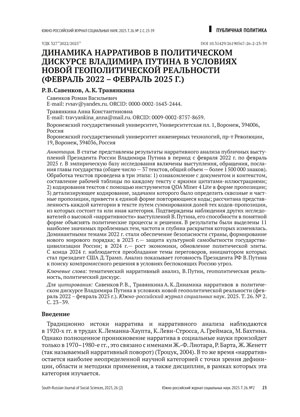Abstract
The article presents the results of narrative analysis of Russian President Vladimir Putin’s public speeches in the period from February 2022 to February 2025. The empirical base of the research includes speeches, addresses, letters from the head of state (the total number includes 37 texts with the total volume of over 1,500,000 characters). The text processing was carried out in three stages: 1) familiarization with the document and context, compiling a worksheet for each text with vivid quotes as an illustration; 2) encoding texts using QDA Miner 4 Lite tools in the form of propositions; 3) detailed coding, whose objectives were to identify cross-cutting and specific propositions. to bring the repetitive codes to a common form; and to calculate the representation of each category in the text by summing up the shares of the codes-entries that make up a given category. Other researchers’ observations about the high “narrativity” of V. Putin’s speeches, his ability to explain political processes and decisions in a clear form have been confirmed. The results highlighted 11 of the most important problematic topics, whose frequency and depth of disclosure varied. Thus, in 2022, the dominant themes were devoted to ensuring the security of the country and the formation of a new world order; in 2023 they concentrated on the protection of the cultural identity of Russia as the state-civilization; and in 2024, on economic growth and the renewal of the political elite. Since late 2024, the topic of negotiations initiated by U. S. President D. Trump has come into focus. The analysis has shown that Russian President Vladimir Putin is willing to search for a compromise solution in the face of threats to Russia.
Keywords
References
Абраменко, А.В. (2014). Нарративная стратегия в контексте асимметричной политической коммуникации (по материалам выступлений В.В. Путина). Исторические, философские, политические и юридические науки, культурология и искусствоведение. Вопросы теории и практики, 11–1, 13–18.
Байша, О. (2023). СВО и закрытие дискурсов: вытеснение альтернативных смыслов и фиксация гегемонистских значений. Социодиггер, 4, 9. Режим доступа https://sociodigger.ru/articles/articles-page/svo-i-zakrytie-diskursov-vytesnenie-alternativnykh-smyslov-i-fiksacija-gegemonistskikh-znachenii
Вольчик, В.В. (2024). Идеология и нарративная экономика. Terra Economicus, 22, 21–33.
Динамика образа Владимира Путина: от Воина к Правителю-Творцу (2024). Доклад коммуникационного холдинга «Минченко Консалтинг». Режим доступа https://minchenko.ru/netcat_files/userfiles/Publichnyi_obraz_Putina_dlya_publikatsii.pdf
Ильин, И.П. (2001). Постмодернизм. Словарь терминов. Москва: ИНИОН РАН: INTRADA.
Итоги 2024 года. Прогнозы на 2025 год. (2024). Доклад Всероссийского центра изучения общественного мнения (ВЦИОМ).
Кара-Мурза, С.Г. (2005). Манипуляция сознанием. Москва: Эксмо.
Каслова, А.А. (2003) Метафорическое моделирование в политическом нарративе «Федеральные выборы» в США и России (2000 г.) (Автореф. канд. дис.). Екатеринбург.
Кастельс, М. (2016). Власть коммуникации. Москва: Изд. Дом Высшей школы экономики.
Малинова, О.Ю. (2016). Официальный исторический нарратив как элемент политики идентичности в России: от 1990‑х к 2010‑м годам. Полис. Политические исследования, 6, 139–158.
Олешков, М.Ю. (2010). Дискурс и текст: нарративная интеграция смыслов. В М.Ю. Олешко (ред.) Дискурс, текст, когниция: коллективная монография (с. 49–59). Нижний Тагил: НТГСПА.
Плахина, Е., Белякова, И. (2016). Бег по кругу: риторика холодной войны в современной российской и американской прессе. Quaestio Rossica, 4(2), 159–180.
Помигуев, И.А., Прокопчук, Т.Л., Кошкин, А.В. (2024). Возможности метода нарративного анализа, или Как искать политические ценности в российском кино? Политическая наука, 4, 45–65.
Савенков, Р.В., Травянкина, А.К. (2024). Динамика паттерна «угроза национальной безопасности» в риторике Президента РФ В.В. Путина в контексте общественных настроений россиян. Вестник Российского университета дружбы народов. Серия: Политология, 26, 436–447. DOI: 10.22363/2313-1438-2024-26-2-436-447
Троцук, И.В. (2004). Нарратив как междисциплинарный методологический конструкт в современных социальных науках. Вестник Российского университета дружбы народов. Серия: Социология, 1, 41–53.
Цзин, Ш. (2024). Стратегии и эффекты литературной дипломатии в выступлениях В.В. Путина. В Материалы Международной научно-практической конференции «Язык и культура: взгляд молодых». Режим доступа https://www.elibrary.ru/download/elibrary_80237692_39488351.pdf
Шейгал, Е.И. (2007). Многоликий нарратив. Политическая лингвистика, 2, 86–93.
Clandinin, D., & Caine, V. (2008). Narrative Inquiry. In Lisa M. Given (Ed.) The Sage Encyclopedia of Qualitative Research Methods (pp. 542–545). Thousand Oaks, CA: SAGE Publications, Inc. DOI: 10.4135/9781412963909.n275
Daphi, P. (2017). Becoming a Movement. Identity, Narrative and Memory in the European Global Justice Movement. London: Rowman & Littlefield International Ltd.
Elliott, J. (2005). Using Narrative in Social Research: Qualitative and Quantitative Approaches. London: Sage.
Forchtner, B., Jorge, M.E., & Eder, K. (2020). Towards a Revised Theory of Collective Learning Processes: Argumentation, Narrative and the Making of the Social Bond. European Journal of Social Theory, 23(2), 200–218
Green, M.C., Brock, T.C. (2000). The Role of Transportation in the Persuasiveness of Public Narratives. Journal of Personality and Social Psychology, 79, 701–721.
Kruse, E.N. (2020, May). Making Sense of Ontological and Epistemological Standpoints in Narrative Analysis. Humboldt University of Berlin. Режим доступа https://www.academia.edu/48980147/Narrative_analysis
Lee, H. Y-H. (2014). Narrative Inquiry / Narrative Analysis. Lecturer’s Note Research Methodology. Режим доступа https://www.academia.edu/9363192/Narrative_Analysis_Narrative_Inquiry
Onwuegbuzie, A.J., Abrams, S.S. (2024). Towards Mixed Methods Narrative Inquiry and Mixed Methods Narrative Research that are Transparent, Rigorous, Ethical, and Equitable (TREE). Journal of Mixed Methods Studies, 9, 82–129. DOI: 10.59455/jomes.2024.9.2
Riessman, C.K. (2004). Narrative Analysis. In W.S. Levis-Beck et al. (Eds), The Sage Encyclopedia of Social Science Research Methods. DOI: 10.4135/9781412950589
Shenhav, S. (2015). Analyzing Social Narratives. New York: Routledg.


